Singapore has announced a plan to limit the amount of sugar in soft drinks by 2020, teaming up with the likes of Coca-Cola, Pepsi, and Nestle and getting them to agree to cap added sugar in drinks at 12 percent.
By now most of us will be familiar with the sugar debate.
We as a society are eating and drinking too much sugar and there are clear health risks, foremost amongst them diabetes and obesity.
Now, countries around the world are struggling to tackle these growing health problems.
So far the most common solution has been to introduce a sugar tax as a deterrent to consumers purchasing soft drinks with high sugar levels; however the ministry of health in Singapore has gone further.
The government announced last week that they are planning to tackle the problem in conjunction with some of the largest soft drinks manufactures in the region.
How well do you really know your competitors?
Access the most comprehensive Company Profiles on the market, powered by GlobalData. Save hours of research. Gain competitive edge.

Thank you!
Your download email will arrive shortly
Not ready to buy yet? Download a free sample
We are confident about the unique quality of our Company Profiles. However, we want you to make the most beneficial decision for your business, so we offer a free sample that you can download by submitting the below form
By GlobalDataThe agreement with the soft drinks companies is part of a focus on behalf of the government to tackle the issue of diabetes in Singapore.
As part of his National Day rally speech, Singapore’s prime minister Lee Hsien Loong said one in every nine people in Singapore suffers from diabetes, a number which rises with age.
Between the companies that have agreed to the sugar cut, approximately 70 percent of drinks available to consumers in Singapore will be subject to the new sugar limit.
Whilst this may sound like a prescriptive measure, health experts have criticised the plan for not going far enough.
The devil is, as always, in the detail.
Many of these companies drinks already fall under the sugar cap as the figure of 12 percent applies to every 100ml, meaning that a single 250ml can could contain a maximum of 30g of sugar.
With the Health Promotion Board of Singapore recommending that people should have no more than 40g-55g of added sugar a day, a single can under the sugar cap would max out the recommended daily intake.
Much like the other measures suggested else around the world, this move alone won’t be enough to solve the health crisis.







